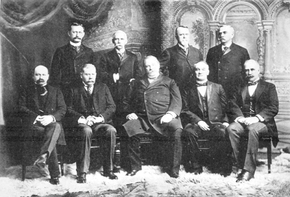Judson Harmon
Judson Harmon (* 3. February 1846 in Newtown , Ohio ; † 22. February 1927 in Cincinnati , Ohio) was an American lawyer and politician , he served as Minister of Justice ( Attorney General ) under US President Grover Cleveland and as governor of Ohio .
Studies and professional career
Harmon served in the Ohio Home Guard during the Civil War . He then completed a general education course at Denison University in Granville , which he finished in 1866 with a Bachelor of Arts (BA) . He then studied law at the Cincinnati Law School and graduated in 1869 with a Bachelor of Laws (LL.B.). After several years as a lawyer, he became a judge at the Court of Common Pleas in 1876 , although he gave up this office after a few months.
In 1878 he was elected judge of the Ohio Higher Court ( Superior Court ) and remained so until 1887. He then worked again as a lawyer. In addition to serving as governor, he was also a professor at the Cincinnati Law School.
Political career

Attorney General under President Cleveland
In 1876 Harmon ran unsuccessfully for the Ohio Senate .
On June 8, 1895, he was appointed United States Attorney General by President Cleveland after the previous Attorney General Richard Olney had been appointed Secretary of State . As Minister of Justice, he served in the cabinet until the end of Cleveland's second term on March 4, 1897. During this time he implemented the antitrust law , particularly in the form of the indictment in the United States v. Trans-Missouri Freight Association . In water law procedures United States v. Texas In 1896 he advocated a theory of absolute territorial sovereignty that later became known as the Harmon Doctrine. Under this doctrine, nations have exclusive jurisdiction and control over the use of water resources within their borders.
Governor of ohio
In 1908 he was elected governor of Ohio for the first time as a candidate for the Democratic Party . He held the office of governor from 1909 to 1913 for two terms. When he was re-elected in 1910, he prevailed against the later US President Warren G. Harding , who ran for the Republican Party . In 1913 he retired from political life. Harmon was the first politician to become governor of a state after serving as cabinet minister.
Special investigator and defeat as a presidential candidate
In 1905 President Theodore Roosevelt appointed him chairman of a commission to investigate the business practices of the Atchison, Topeka and Santa Fe Railway . In doing so, he discovered that a million dollar bribe had gone to the president of the railroad company, Paul Morton . The Commission's findings embarrassed President Roosevelt in particular, having recently appointed Morton as Secretary of the Navy . Harmon proposed bringing lawsuits against Morton and other directors of the railroad company, but this did not materialize after the President's intervention. However, Navy Minister Morton had to resign on July 1, 1905.
In 1912 he was defeated as a presidential candidate at the Democratic National Convention by the future President Woodrow Wilson , after the former Democratic presidential candidate and later foreign minister in Wilson's cabinet, William Jennings Bryan , had called him a reactionary because of his opposition to national initiatives and referendums .
It was in honor of Harmon County in Oklahoma named.
Web links
General biographical information
- Biographies of President Cleveland's Cabinet Members ( May 5, 2015 memento on the Internet Archive )
- Biography on the homepage of the Ministry of Justice (English)
- Judson Harmon in the National Governors Association (English)
- Biography in the US legal dictionary. (English)
- James L. Burke: Judson Harmon: The Dilemma of a Constructive Conservative. In: Cincinnati Historical Society Bulletin. 31, 1973.
- Judson Harmon in the Ohio History Connection Archives
- Judson Harmon in the Miller Center of Public Affairs of the University of Virginia (English)
- Judson Harmon in the database of Find a Grave (English)
Literature on the Harmon Doctrine
- Henni Hansen: Restrictions under international law on sovereignty to protect the environment. Berlin 2004.
- Knud Krakau: The Harmon Doctrine. A thesis of the United States on international river law. Hamburg 1966.
- Stephen C. McCaffrey: The Harmon Doctrine One Hundred Years Later: Buried, Not Praised. In: Natural Resources Journal. 36, 1996.
| personal data | |
|---|---|
| SURNAME | Harmon, Judson |
| BRIEF DESCRIPTION | American lawyer and politician |
| DATE OF BIRTH | February 3, 1846 |
| PLACE OF BIRTH | Newtown , Ohio |
| DATE OF DEATH | February 22, 1927 |
| Place of death | Cincinnati , Ohio |

